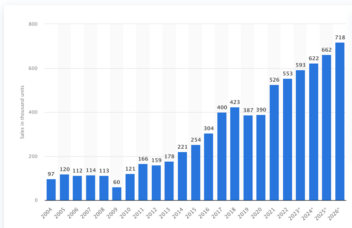Artificial Intelligence will impact consumers, businesses, and our society in many different ways. But while healthcare, education, etc. have gotten a lot of attention, manufacturing and industry has not gotten a lot of attention when it comes to the impact AI will have in the future. That’s good reason to take a closer look today.
Producing physical goods is oftentimes seen as “old industry”, and that makes some sense. After all, clothes, furniture, and metal products have been manufactured for hundreds or even thousands of years. While production processes have changed a lot, of course, these are still “older” industries compared to new industries such as social media, digital communication, and so on.
But even when it comes to “old” industries, processes are always changing, and companies are seeking ways to become more efficient – in order to bring down expenses and in order to gain an advantage versus competitors. Ford’s (NYSE: F) introduction of the assembly line around 100 years ago was a huge leap when it came to making production more efficient and easier to scale, but further progress has been made ever since, e.g. due to the introduction of robots in manufacturing.
Artificial Intelligence will have a huge impact on production, and, by extension, on the industrial sector in the coming years and decades as well.
Artificial Intelligence will allow for smarter robots in the future, with way more processes being automated or semi-automated compared to today. The number of robots being used to produce goods has been growing for many years, as the following chart shows:

(source: statista.com)
The number of robots being shipped has been rising for the last two decades, and further growth is expected. With robots becoming more advanced and smarter due to AI, many more additional tasks will be doable by robots in the future. Tesla (NASDAQ: TSLA) is one of the pioneers of developing advanced humanoid robots that can be used for many different tasks during production processes.
Companies that manufacture goods oftentimes have large capital needs to finance their inventories. With the help of Artificial Intelligence, supply chains will become more efficient in the future – AI will help predict incoming orders, so that inventory levels can be optimized, which should free up capital and reduce costs, streamlining the entire manufacturing process.
Quality control is another important area where Artificial Intelligence will impact industrial companies. Optimizing quality and reducing the risk of faulty products being shipped to customers will not only prevent costly lawsuits and PR disasters such as the Takata airbag troubles that led to the recall of millions of vehicles, but better quality controls will also make consumers happier and safer. Advanced AI-empowered inspection, using vision, x-ray tools, and so on will help companies detect issues early on when they are easier (and cheaper) to fix.
How To Benefit From The AI Impact On Producing Companies
Investors can choose among some of our Artificial Intelligence picks to benefit from the broad Artificial Intelligence MegaTrend, which automatically gives investors exposure to AI usage in producing industries. But investors can also opt for more specialized “AI in production” exposure.
Tesla, which is diversifying away from its automobile business, is expanding in the AI space, including via its robot venture. Its humanoid robots will be used in Tesla’s fabs, but will also be sold to customers in the future.
Qualcomm (NASDAQ: QCOM), with its sensors and interconnectivity solution, should be among the beneficiaries of more (and more advanced) robots being used in production. These robots need to communicate with each other, after all, and they need to be aware of their surroundings, which requires a large number of advanced sensors.
NVIDIA (NASDAQ: NVDA), the king in the AI space, is another company that should benefit a lot from increased AI usage in manufacturing and production processes. When companies utilize advanced AI-based algorithms to solve problems, NVIDIA has likely supplied the chips that power these algorithms, after all.

